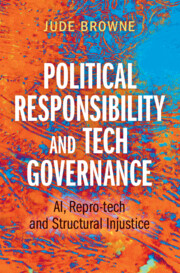Book contents
- Political Responsibility & Tech Governance
- Political Responsibility & Tech Governance
- Copyright page
- Dedication
- Epigraph
- Contents
- Preface
- Acknowledgements
- Introduction
- Chapter 1 The Problem of Structural Injustice
- Chapter 2 Artificial Intelligence and Ground Truth
- Chapter 3 Repro-tech and the Genetic Supermarket
- Chapter 4 Putting the Public into the Public Body
- Chapter 5 Conclusion
- Appendix Legal, Moral and Structural Actions, Injustices and Responsibilities
- References
- Index
Introduction
Published online by Cambridge University Press: 21 February 2025
- Political Responsibility & Tech Governance
- Political Responsibility & Tech Governance
- Copyright page
- Dedication
- Epigraph
- Contents
- Preface
- Acknowledgements
- Introduction
- Chapter 1 The Problem of Structural Injustice
- Chapter 2 Artificial Intelligence and Ground Truth
- Chapter 3 Repro-tech and the Genetic Supermarket
- Chapter 4 Putting the Public into the Public Body
- Chapter 5 Conclusion
- Appendix Legal, Moral and Structural Actions, Injustices and Responsibilities
- References
- Index
Summary
Not a day goes by without a new story on the perils of technology. We hear of increasingly clever machines that surpass human capability and comprehension, of tech billionaires imploring each other to stop the ‘out-of-control race’ to produce the most powerful artificial intelligence which poses ‘profound risks to society’, we hear of genetic technologies capable of altering the human genome in ways we cannot predict and a future two-tier humanity consisting of those of us who are genetically enhanced and those who are not. How can we respond to these stories? What should we do politically? By way of exploring these questions (using the UK as the primary example of context), I want to move beyond the usual arguments and legal devices that serve to identify tech developers, and users, as being at fault for individual acts of wrongdoing, recklessness, incompetence or negligence, and ask instead how we might address the broader structural dynamics intertwined with the increasing use of AI and Repro-tech. My argument will be that to take a much sharper structural perspective on these transformative technologies is a vital requirement of contemporary politics.
- Type
- Chapter
- Information
- Political Responsibility and Tech GovernanceAI, Repro-tech and Structural Injustice, pp. 1 - 11Publisher: Cambridge University PressPrint publication year: 2025

